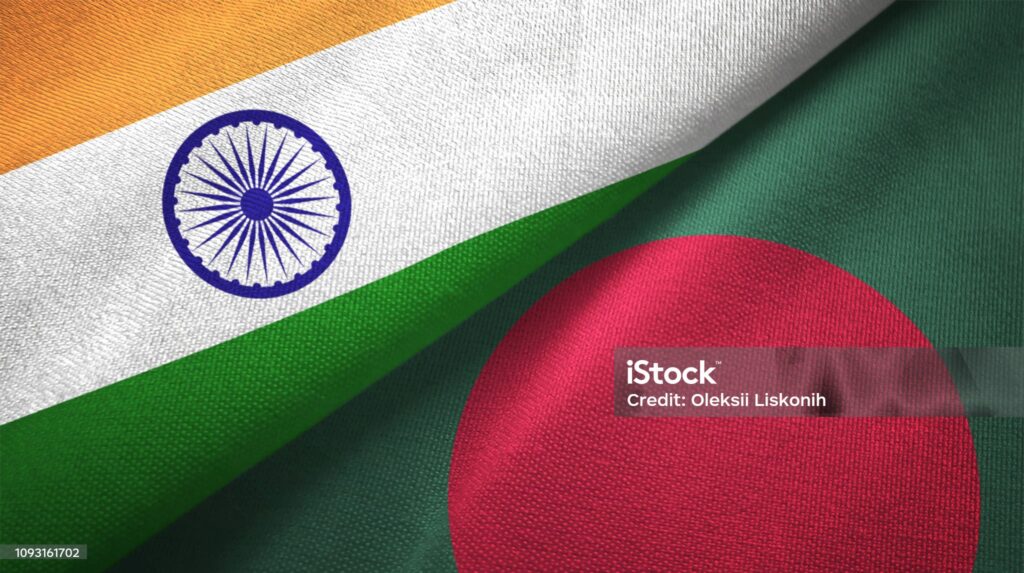
Anish Esteves based in Mumbai, India writes in this article, exclusively for the Lusophone Society of Goa, about some important aspects of the crisis in Bangladesh and the consequences for India, for example in the textile industry. In addition, the political turmoil in Bangladesh raises important security concerns for India, explains Anish Esteves, or even that it has economic repercussions, as Bangladesh is India’s largest partner in the subcontinent. Infrastructure and connectivity are also key to India-Bangladesh relations and that the coming months will be crucial in shaping the future of India-Bangladesh relations.
The Bangladesh Crisis
and its Implications for India
The crisis in Bangladesh poses significant risks to India’s textile industry, trade relations, and regional security. While it presents opportunities for Indian companies to capture diverted orders, it also threatens economic ties, infrastructure projects, and the stability of Indian investments in Bangladesh.
by Anish Esteves August 30, 2024

India and Bangladesh Flags
The recent crisis in Bangladesh has not only shaken the geopolitical landscape but also raised concerns about its impact on India. As a key ally and trading partner, any further instability in Bangladesh could have far-reaching consequences for India’s textile industry, trade ties, financial markets, infrastructure, and connectivity.
One of the most immediate concerns for India is its textile industry, which heavily relies on Bangladesh for raw material supply, low labour costs, and high production volume. Indian textile houses benefit significantly from Bangladesh’s lower manufacturing expenses, making it an attractive location for cost-effective production. Bangladesh, having established itself as a global leader in garment manufacturing with high production capacity, enables Indian textile houses to meet large orders efficiently. This interdependence underscores the potential risks that the current crisis poses for the Indian textile sector.
However, this crisis in Bangladesh also presents an opportunity for the textile and apparel industry in India. With the capacity to accept additional orders and establish trade relations, Indian companies have a chance to gain a major share of the diverted orders and strengthen their global presence.
Additionally, the political turmoil in Bangladesh raises important security concerns for India. For a long time, New Delhi has relied on Sheikh Hasina to curb the influence of radical Islamic terror organisations. Under Hasina’s rule, Bangladesh actively countered Pakistan’s Inter-Services Intelligence network, linked previously to some of these militant groups, and made active efforts to eliminate Islamist outfits.

Bangladesh founder Mujibur Rahman on a Currency Note
Her ouster could lead to increased extremism and the rise of other radical groups, which may have links with terrorist outfits based in Pakistan, potentially expanding their activities into Bangladesh. The actions of Jamaat-e-Islami and its student wing, Chhatra Shibir, in the protests, will leave neighbouring countries on high alert about the prospect of cross-border threats. Given India’s geographical proximity and historical tensions with Pakistan, this scenario presents a significant security challenge.
Economically, Bangladesh is India’s largest partner in the subcontinent, with bilateral trade amounting to $13 billion in the financial year 2023-24. The close trade relationship had led to discussions of a free trade agreement (FTA) that would reduce or eliminate customs duties on goods traded between the two countries. However, the ongoing crisis could delay or impact these negotiations, potentially affecting future trade dynamics.
India is a major exporter to Bangladesh of commodities such as spices, transport equipment, metals, electronic equipment, plastics, chemical and related products, and machinery. For example, manufactured goods and agriculture and allied products together accounted for more than 75 percent of exports to Bangladesh in 2023-24. The unrest in Bangladesh has caused these exports to come to a standstill. Further deterioration of relations with India will immediately result in a decline in exports, higher inflation, a reduction in GDP, and a loss of jobs.
In addition to economic concerns, the crisis also impacts the presence of Indian FMCG companies in Bangladesh. Firms like Dabur, Marico, Nestle, Hindustan Unilever, Coca-Cola, and PepsiCo, which have a significant presence in Bangladesh, could face operational challenges if instability persists. Despite immense political opposition, the Sheikh Hasina government rolled out the red carpet for Indian investors and adopted several measures to woo them, such as starting designated special economic zones in the country. Unhappy with India’s alleged support of Ms. Hasina’s regime, her opponents launched an “India Out” boycott campaign movement targeting Indian goods. Since Ms. Hasina is no longer in power, the interim or future governments may adopt a hostile attitude towards Indian companies.
Infrastructure and connectivity are also central to India-Bangladesh relations. Since 2016, India has extended credit to Bangladesh totalling $8 billion for infrastructure development, including road, rail, port, and shipping projects. Notably, the Akhaura-Agartala cross-border rail link and the Khulna-Mongla Port rail line, inaugurated in November 2023, were designed to enhance tourism, trade, and people-to-people exchanges. However, the crisis in Bangladesh could restrict India’s access to the Northeast region, which is connected to the mainland only through the narrow “Chicken’s Neck” corridor between West Bengal and Assam.
Existing bus routes and agreements for using Chittagong and Mongla ports also face potential risks. In addition to these projects, the Maitri project, a transborder pipeline project funded by India to transport high-speed diesel from the Numaligarh refinery in Assam to northern Bangladesh, may be delayed or halted.
The political turmoil in Bangladesh represents a critical juncture not only for the country but also for regional stability. With Sheikh Hasina’s departure potentially marking a significant shift, India will need to navigate this period with a thoughtful and proactive approach. Collaborating with the current Bangladeshi leadership will be essential. This crisis underscores the volatile nature of South Asian politics and the rapid changes that can occur, highlighting the need for India to engage flexibly with various stakeholders while pursuing its strategic goals.
The coming months will be pivotal in shaping the future of India-Bangladesh relations. India’s ability to adapt and respond to the evolving situation will be crucial in maintaining stability and fostering a constructive partnership.
 Anish Esteves
Anish Esteves
Anish Esteves works for a start-up based in Mumbai, India. His work has appeared in reputable publications such as Asia Times, The Round Table, O Heraldo, The Goan, Outlook, and The Meghalayan, among others. He is also a member of the IGSCP-PE, a group that focuses on the role of the Portuguese colonial periodical press in the development and linking of modern cultural and political concepts and realities. He is on X @AEthejourno.




